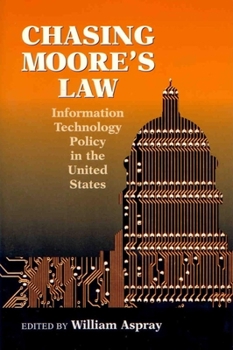Chasing Moore's Law: Information Technology Policy in the United States
Select Format
Select Condition 
Book Overview
Providing a comprehensive and accessible introduction to today's U.S. information technology policy issues, this title identifies the main players, and describes the history of legislation and court... This description may be from another edition of this product.
Format:Paperback
Language:English
ISBN:1891121332
ISBN13:9781891121333
Release Date:December 2004
Publisher:SciTech Publishing
Length:322 Pages
Weight:1.03 lbs.
Dimensions:0.8" x 6.1" x 9.0"
Customer Reviews
2 ratings
Law vs. Law
Published by Thriftbooks.com User , 18 years ago
Non-technical users of computer technology are pleased and often surprised at the incredible advances that continue to be achieved in processor speed and memory capacity, and at the ever-shrinking prices of computer systems and components. What isn't well known to the general public is that this progress is made in accordance with Moore's Law, which states that the number of transistors per square inch on integrated circuits must double every 18 months, increasing capacity and speed while reducing manufacturing costs. Moore's Law is driving the advance of technology at a break-neck pace, and few insiders believe that it will be repealed anytime soon. Since it was enacted in 1965, Moore's Law has been a benefit to consumers but often a headache to computer chip manufacturers, who have been arguing for its repeal. Various consortiums and lobbying groups -- with members from industry lights such as Intel, AMD, and IBM -- contend that the pace of innovation demanded by the law is too intense, requires too much research and development expenditure, and commits corporate resources that could more profitably be invested in the development of consumer electronics such as high-definition televisions, phonographs, and celebrity-themed video games. Consumer advocates insist that Moore's Law should remain in effect so that advanced information technology will be increasingly accessible to the working class. Voices on the right decry Moore's Law as a violation of free-markets principles, insisting that the pace of innovation should be set "by the innovators themselves" (Milton Friedman). Aspray's book balances the different sides of the issue, showing on the one hand the great benefits that the use of computer systems has provided for the average consumer -- there is one touching story of a crippled Hispanic boy's first mouse-click -- and on the other hand the great strain that is put upon the corporations and individual engineers who must continue to innovate relentlessly (it's horrific when Aspray visits the psychologist at Intel's Santa Clara counseling center and reads some of the stories -- first published here -- of depression, divorce, and suicide.) Though Aspray makes a commendable effort to be even-handed, it is clear upon reflection that his sympathies lie with the consumers rather than the producers, noting in the book's epilogue that because of the law, the benefits of the information age will reach "even the remotest Inuit tribes and poorest Hmong families". Anyone looking for an overview of this crucial policy issue will be well served by this volume.
Concise and Fun
Published by Thriftbooks.com User , 19 years ago
I'm one of those people who knows how to use the internet and computer, yet I find myself with minimum knowledge of how information technology came to be. Its fascinating reading the stories of monopoly of AT & T or Western Union. I'm only 25 so I wasn't born duing the time of the birth of telecommunications and computer convergence. It felt like I was reading a gossip column. Maybe that sounds demeaning. Anyway, I find this book clear cut and very informative. When the book was shipped to my office, Iflicked through the covers and frowned as I caught glimpses of legislative "acts" which made me doubtful if I'll ever enjoy this book. I was about to resign to simply reading news article when I decided to read the preface. Then I said "so that's why it's titled "Chasing Moore's Law." Overall, I find my reading pleasurable. I take down notes to remember sme important details. This is the latest book published on information technology. I'm learning immensely. cool!




